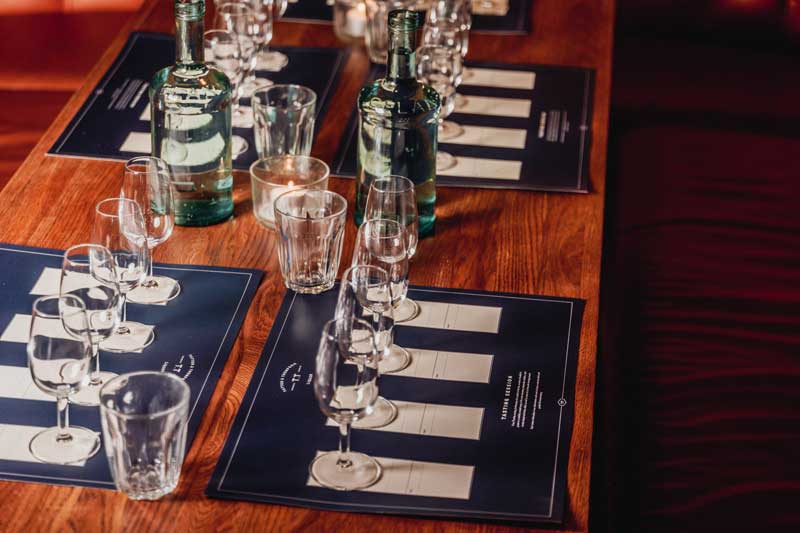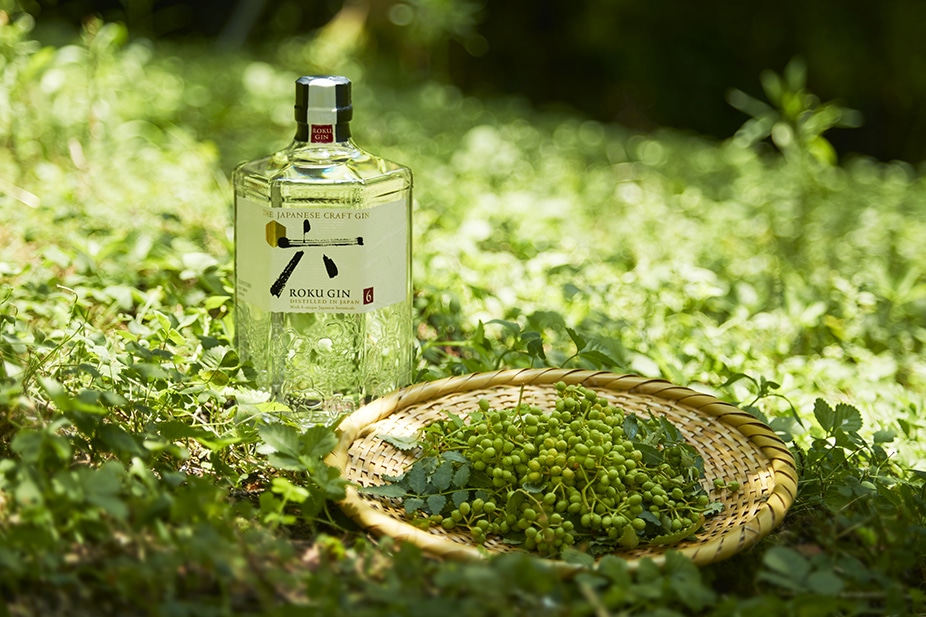Please note: Many of the magazine articles on this site reference events held at our former venue on Kingsland Road. While we no longer operate from that location, we are now proudly based at our new venue on Great Eastern Street.
A dive into Roku Gin with James Bowker
We recently sat down with James Bowker, House of Suntory's UK Brand Ambassador and one of the nicest people in the industry, to chat about all things Roku, covid challenges, and future plans - with a little bit of Japanese philosophy thrown in for good measure.
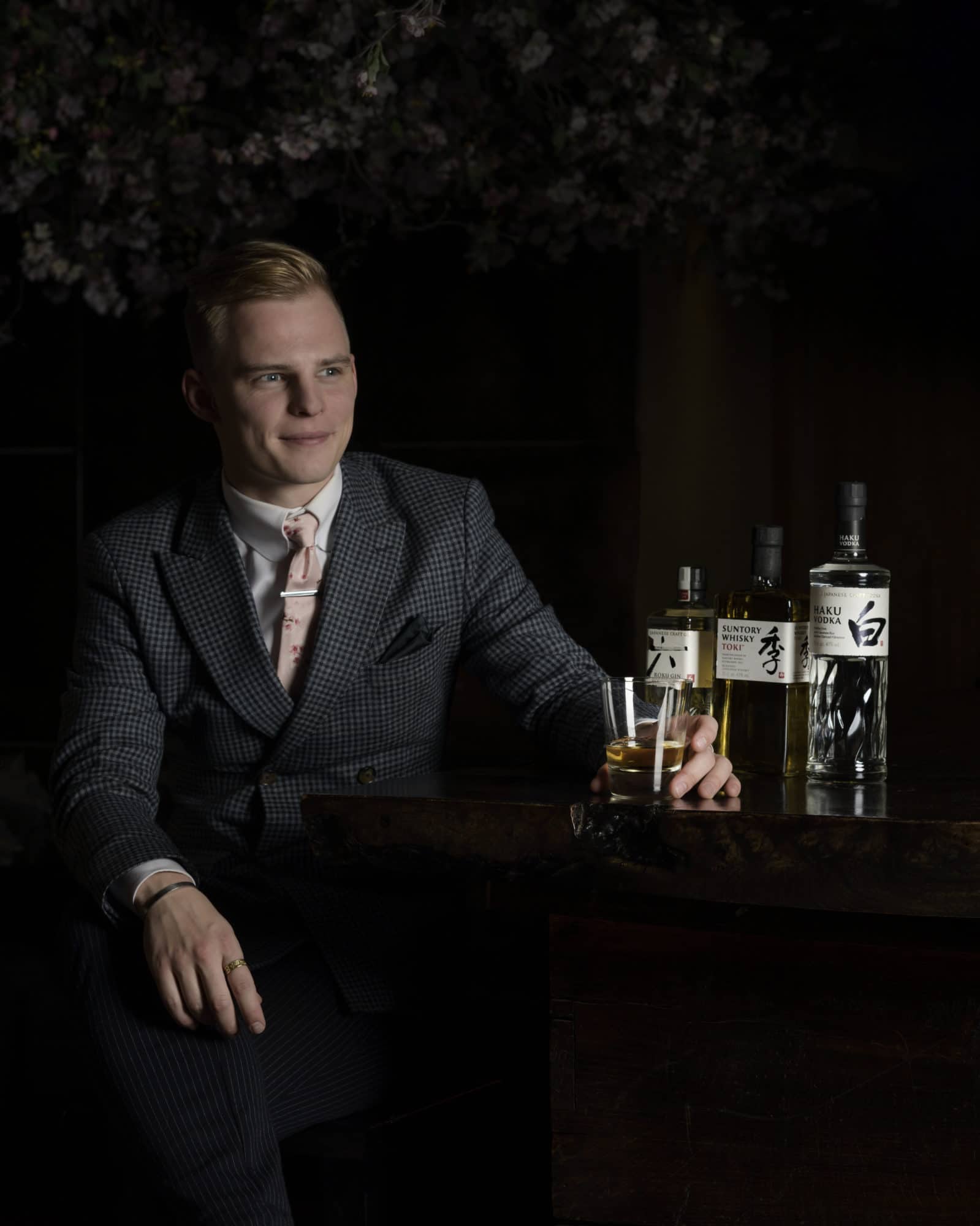
So first of all, for those who maybe don’t know you, could you please introduce yourself for us?
Absolutely. Well, it’s lovely to be here, and thank you for having me. My name’s James Bowker and I’m the UK brand ambassador for the House of Suntory. I’ve been in the drinks industry for about 12 years now, which seems really, really long, but it’s flown by. And I’ve been generally in the world of cocktails and fine dining before working with Suntory. But Japan’s always been, I guess, the place I’ve been most obsessed with in the world of food and drinks.
It’s got so much going for it, hasn’t it? So you touched on it there, but tell us about how you got into the drinks industry initially, so what you were doing before Roku? Was it sort of a traditional affair or a road less travelled?
I think pretty classic for most bartenders. I think most of us fall into it in one way or another. And so most of us, we get to a certain age where you need a bit of spare cash. And some people might go into retail, some people might go into helping their parents out in the office, and then the rest of us end up working in bars and restaurants. So I must have been about 15, 16 years old, and I was looking for bus money because I lived in the middle of the countryside, in the middle of nowhere. And the only business I could get a job was my local pub. So I went in there. It was a bit of a rough pub. It was on the canal, so you had quite a lot of rough people coming in and out, but also, a whole bunch of amazing communities. The canal boaters were just this incredible kind of hippy but very kind of philosophical community. So a great start to it. And then through university, it seemed like a logical way to keep funding myself. And that was where I got into cocktails and, eventually, into the world of that kind of top-end kind of five-star hotel service and fine dining. And you discover Japanese whisky naturally when you’re surrounded by all these fancy types because it became very, very popular about 10 years or so ago. And it was during this time that I got my first taste of Yamazaki 10-year-old. And I remember tasting it and going, “That’s the first whisky that I haven’t hated.” And then I kind of gradually started exploring it. I went out to stay in Japan for a bit, and here I am now.
Amazing. So a little bit of both in there then. How did you end up working with Roku, specifically? Was there anything particular that drew you to them?
Well, I’ve been absolutely obsessed with the whole of Asia since a very young age, I’ve always had this fascination with Eastern culture. And then as I kind of went into the world of bartending, I was working in this pub, and we had this huge whisky collection of around 200-odd bottles. And I kind of knew nothing about them. And one day, this guy walked in and said, “Oh, I want something that’s like a Laphroaig.” And I now know that Laphroaig is really big, smoky, powerful, one of the smokiest whiskies out there. But at the time, I was 17 years old. I had no idea. And I just looked at the bottles and said, “Oh, well, which one looks pretty? And which one will I want to have a little taste of once I’ve already got it open?” And I recommended a Glenrothes, which is about as light as a whisky comes. It was a terrible, terrible recommendation! But my boss, basically, said, “Crack on. Taste everything.” That’s where I had the opportunity to try that Yamazaki.
And so, what he decided was he wanted to give the gift of authentic Japanese spirits. That’s the way he phrased it, and I found that phrase quite fascinating as soon as I heard it.
I’ve worked in some really great places, but one of them was called The Edgbaston in Birmingham, a five-star hotel. And we had quite a large Japanese whisky collection. And one of my colleagues, who was very much my mentor and taught me all the basics that I know and really made me obsessed with this world, showed me the light, as it were, of Japanese whisky because I always loved delicate, complex flavours. I now really do enjoy a big smoky whisky, a punchier or a sherry cask, but generally, my preference would be that lighter, delicate style – be it cognac, whisky, or anything else. And then, eventually, I had just had this really rough year about five years ago or so, where lots of things just didn’t go the way I wanted them to. I was feeling a bit down in the dumps, and my mental health wasn’t in a perfect position. And I, basically, had that kind of escapist moment. I was like, “I need to just escape this funk that I’m in.” And so I kind of decided to just go to Asia and got super lucky that a friend of mine was a good pal of Ueno San over at Bar High Five. So I got a phone call out of the blue one morning. And it was the man, the myth, the legend, Master Ueno San from Bar High Five, and he just said, “Right. I hear you want a job. When can you be here?” I said, “Two weeks.” And the next thing you knew, my PhD was quit, my job was quit, my rental contract was quit, and plane ticket was booked. And since that trip to Japan, I’ve just not stopped with my obsession with the country. And so much of that has just naturally fallen into place thanks to this work with Roku, because I think Suntory is arguably the best representation of Japanese flavour in spirits. So it’s sort of a good mixture of happenstance and partial subconscious design, and that even extends to the actual job itself. I never wanted to be a brand ambassador! I’ve actually always said to people that the only brands I’d ever be a brand ambassador for would be Suntory or Laphroaig because these are two of my favourite brands. And then next thing you know, about two years ago I get this phone call saying, “Oh, James, I hear you want to leave your current job. What are you looking for?” And I said, “Well, I want to probably go back to Asia.” And they said, “Well, I can’t get you to Asia, but I know that Suntory needs a brand ambassador,” and I was like, “Yes. That is the job for me.” [laughter]
So we’ve recently been concealing measures of Roku in hundreds of our boxes that have been going out over the Christmas period as the ‘mystery spirit’ for our virtual classes. Do you want to sort of unveil a little bit of that mystery for our readers and just tell us a little bit about the liquid that goes into the bottles, what they’ll be getting to play around with and some of the processes behind it?
So the first thing to say is that Roku is an expression of Japanese culture. One of the things I really love about Suntory is that’s it’s the original Japanese spirits company, as well as being the oldest. And another of the things that I really love about them is their whole story; their ethos and the way they make their spirits. They were founded 120 years ago by Shinjiro Torii, who had a background in pharmaceuticals but who also had this huge obsession with Western spirits. And he really wanted to give the gift of spirits to Japan because, during the Edo period, they hadn’t had access to spirits in the way the rest of the world had. And in Japan, honour is such an important thing. The best way to achieve honour, for them, is to give something to your homeland. It’s the reason why joining the military is seen as such an honourable thing because you’re, potentially, putting your life on the line. And so, what he decided was he wanted to give the gift of authentic Japanese spirits. That’s the way he phrased it, and I found that phrase quite fascinating as soon as I heard it.
I was lucky to spend some time at the distillery at Yamazaki and, going through some of the historical documents and everything else, this idea of authenticity and Japaneseness is something that kept coming up. For example, the ‘Sun’ in the word ‘Suntory’ refers to the actual sun in the sky. The sun is the source of all of energy, hope and life, both in Buddhism and in Shintō tradition. And so you have this ethos at the House of Suntory that we are first and foremost about being Japanese. And so with Roku, and with all of the other spirits, the idea is that, first and foremost, it needs to be made 100% in Japan, which can’t always be said for our competitors. Secondly, it has to be made following the authentic traditions of that spirit. So take gin, for example. I don’t know about you, but for me, and, I think, for most of us, a traditional authentic gin is supposed to use the real botanicals to create these flavours in your gin rather than using essences or flavourings or E numbers, perhaps. You want to use the real botanical. So that’s one example of authenticity. But they take it that one step further at Roku. So they will look at that and go, “Okay. Well, how can we be even better?” So, for example, they’ll use fresh botanicals. We don’t dry or preserve any botanicals, which is quite unusual in the world of gin because dried botanicals generally lend more flavour. The difficulty is, despite being more intense, it’s less complex. In Japan, we’re much more about delicacy.
Suntory has been making gin since the ’30s, but it’s only in the last five years we’ve released Roku because, in Japan, it’s so important to perfect something before you make it public and before you say, “Look, this is the international representation of our country.”
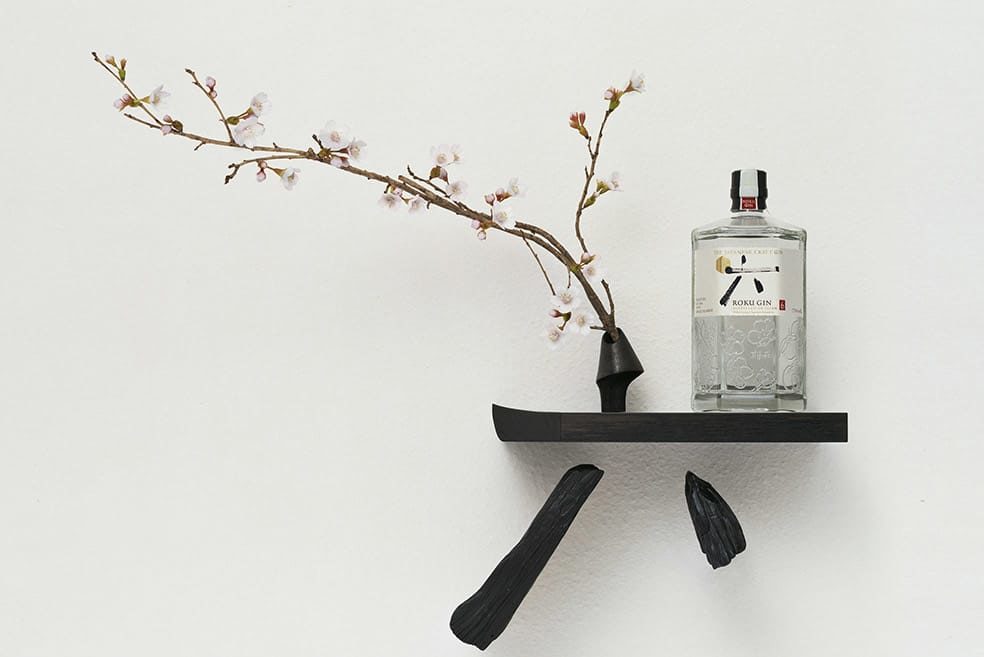
At Roku, it was all about firstly working out what authenticity looks like for us when making a gin. Citrus, spice, floral. Those seem to be the main camps of flavour, I think, and that’s I think the real, authentic taste of traditional gin. So London Dry has those in big proportions. A big amount of juniper. Big amount of citrus. Big amount of floral, etc. And we have seen this spectrum arise in recent years where on the far end, you’ve got that. And then on the other far end, you’ve got those kind of weird and wacky botanicals where maybe you just taste one thing quite intensely. Suntory has been making gin since the ’30s, but it’s only in the last five years we’ve released Roku because, in Japan, it’s so important to perfect something before you make it public and before you say, “Look, this is the international representation of our country.” Because, actually, Roku is saying, “This is not just our gin. This is the gin of Japan. And so if we don’t do a good enough job, that’s deeply shameful and deeply dishonourable.” So it was all about really going, “Okay. How can we simultaneously cover those traditional flavour camps but also discover something that’s right for the Japanese sensibilities and the palate?”And when you think about the food of London, if we’re talking about London Dry, compared to the food of Japan, we’re thinking, “Okay. Well, we’ve got fry-ups and fish and chips compared to sushi and ramen.” So you’ve got a much more delicate Japanese palate to get across. And what we’ve tried to do, therefore, with Roku is capture those traditional flavour camps whilst making it a more delicate and more complex spirit in line with the Japanese palate.
Something else that ties in with this idea of authenticity is that we’re doing it in concert with nature and the seasons. So Roku is very much inspired by the four seasons and bringing into harmony those different elements of nature. So each of the botanicals – there’s six; Roku means six – are taken from what we consider to be kind of the key botanical of that season. So that’s two different types of cherry blossom in spring, two types of green tea in summer, some sansho spices in autumn, and some yuzu in winter because, for us, these specific botanicals best represent the Japanese flavour culture at those times of year. And when we bring them into harmony, you’ve got a perfect representation of our culture.
In Japan, there’s a real philosophy around delicacy of the glassware because then you’ve got a minimal barrier between you and your drink, right? It sounds very philosophical, but it does make a psychological difference.
Brilliant stuff. It’s great to hear just how much thought and process goes into it. On that note, have you got any signature serves that you’d recommend Roku to go with?
Good question. I mean, I genuinely find Roku to be one of the best examples of a gin that can be used in lots of different ways because, as I mentioned earlier, it’s got that classic DNA of a London Dry in so far as it’s got the flavours you expect. But it’s a little bit subtler. It’s a little bit more easygoing, which can just make it easier to mix, in some instances, because some gin cocktails, people might find one flavour punches through too much whereas this is nice and balanced.
So the signature serve officially is, of course, a Roku Gin and tonic. The main difference with a Roku Gin and tonic compared to the way you might classically make it is in Japan is that we’re obsessed with the details and getting that sense of perfection in place. So we’re really focused on making sure you’ve got a nice quality glass available. In Japan, there’s a real philosophy around delicacy of the glassware because then you’ve got a minimal barrier between you and your drink, right? It sounds very philosophical, but it does make a psychological difference. Getting lots of ice in there as well, of course. If you can use good quality Japanese crystal block ice, beautiful. If not, any ice is fine. But then, key to this is that we garnish with ginger. So if you look at the classic pH scale, we’ve got neutral in the centre. Normally, we would garnish with citrus, which would be over here, on the acidic side. But we’re using a really special citrus called yuzu, and the problem is if you whack a wedge of lime, say, on top of your gin and tonic, every time you take a sip, the delicate yuzu aroma will be overpowered by the familiar lemon or lime. So instead of using that citrus, we use ginger, which is on the opposite side on the pH scale. So it does the same thing as citrus in terms of being refreshing and kind of enlivening on the palate but not in the same way. It doesn’t cover up those unique yuzu flavours. So that’s one great drink: a Roku Gin and tonic with ginger, genuinely outstanding.
The one we’re focusing on with you guys is probably my favourite, though. It’s a twist on a true classic: the Negroni. And I kind of have a spring/summer Negroni and an autumn/winter Negroni. My sister works in fashion. She’s amazing; the stuff that she makes. And so it’s kind of filtered down to me to a certain extent, this interest in fashion. I was talking to her about kind of spring/summer, autumn/winter collections, and I decided I had to have my favourite cocktail, the Negroni, as a spring/summer, autumn/winter. So for the spring/summer Negroni, we do classic ratios: equal parts of Roku Gin, Campari, and sweet vermouth. But then I tend to splash in an ingredient that enhances those cherry blossom aromas. So for me, Luxardo Maraschino, if you put a bar spoon of that in there, – because it’s got a similar kind of almond-like kind of aroma – is going to really accentuate that cherry blossom in the gin. But, of course, you can find cherry blossom teas or you can find cherry blossom liqueurs, whatever, but a little touch of something with that flavour brings out those beautiful blossom flavours. And then for autumn/winter, of course, we’re embracing that wonderful yuzu citrus fruit that every chef and every bartender has been obsessed with for the last 10 years or so. So I, again, just put a bar spoon of either fresh yuzu juice or yuzu sake, it doesn’t matter as long as it’s got that delicate acidity to it. So yeah, equal parts, 30ml each, of Roku Gin, Campari, sweet vermouth, and then just a bar spoon or a teaspoon of yuzu sake or yuzu juice.
We’ve simply got to try that. Now to address the elephant in the room: we’ve asked a lot of basically UK-based people in the drinks industry this question, and we’d be keen to hear your views. Obviously, 2020’s been an odd year, to say the least. It saw – to use the most hated buzzword of 2020 – unprecedented challenges for everyone in the drinks industry. And the consensus seems to be it was, basically, the biggest challenge we’ve faced. Was this an experience you shared?
Yeah, it’s been such a hard year in so many ways, I think. And one of the best phrases that I’ve heard to describe this year, to bring a bit of levity, was “the corona coaster”, and that’s generally been the way it’s felt for most of us. Every conversation I have, from friends to family to industry peers, we all say the same thing. It’s just emotionally, we’re all over the place. One day seems really optimistic. The next day is really, really tough. I mean, from a business perspective, we have no reason to complain. There’s still people drinking gin. There’s still people drinking whisky. The supermarkets, as we all know, are doing a great job, so I’m really not at all worried about the business end of things. My concern comes for my friends and family in the drinks industry, particularly in the world of hospitality – as you and I know, I’ve spent 11 years prior to being an ambassador working directly on the frontline in restaurants, in bars – all of my best friends. My partner has been on furlough since the beginning of this and it’s just been horrendous for her.
We really are a family, I think, in the bar industry and in the general hospitality industry, and people are doing the most amazing small acts of kindness to support each other.
And so what we’ve tried to do as a business, as Suntory, is just, basically, we’ve cancelled the vast majority of the plans that we had had and instead gone, “Okay. How can we just focus on supporting and working out what is it that people need?” So we’ve done loads in terms of supporting venues with their bottled cocktail programs, where they buy bottles, what some of the legal requirements are for different types, labelling queries and so forth. So there’s been the business side of it. And then on my side, it’s been pastoral. I’ve been thinking, “What would I be needing right now if I was still working in bars?” And, frankly, brand engagement in the traditional sense isn’t it. It’s friendship. It’s support. There’s a group of about 30 or so bartenders that I have very close to me that I work with a lot. And I just try and make sure we have a proper phone call every fortnight, a long phone call where we really engage. It’s not, “Oh, how are you? Oh, I’m fine.” It’s proper deep discussion and just showing that level of personal touch. And it’s been heartbreaking, to be honest, the amount of really tough stories I’ve heard and tough times friends are going through. But, at the same time, we see this incredible positivity and those green shoots emerging after someone goes through something rough.
But we really are a family, I think, in the bar industry and in the general hospitality industry, and people are doing the most amazing small acts of kindness to support each other. And you see this almost cyclical effect where one person helps another, and then that person helps another – you kind of see it being passed along in this chain. And I have to say, they’ll say some industries will never die, and that certainly applies here. Hospitality will never die because people always want to drink. But beyond that, people will always want kindness and support, community and socialising. And we’re an industry based on looking after people. That’s what it is. It’s hospitality. It’s not boozitality. It’s not fooditality. It’s hospitality.
100%. Seeing the way people have banded together and seeing the sheer range of amazing initiatives that have been going on has been truly heartwarming. So, to move on to a topic sort of related to that last question, how do you think activities like virtual cocktail classes can help consumers and brands like Roku and others like yourselves sort of interact with consumers, considering bars have been opening and closing?
Yeah. I mean, for me, it’s been great, actually, seeing them because it helps so many people. It’s also great for us as a brand. Of course, we’re relatively new in the world of gin. We’ve only been around as a brand for five or six years, despite, as I say, having been making it since the 1930s. But it allows us to build awareness and the reputation of the brand, which is great from our perspective. But even more importantly, actually, is the way it allows us to support venues like yourselves because, obviously, if we’re going to be really brutal and blunt about it, if all the venues closed, we’re in real trouble! So the ability to be able to host these sorts of online events, which allow income to still come through the tills of some of our best customers and engage consumers, the third group, who are- frankly – maybe a bit bored.[laughter]
On that note, about three weeks ago, I had some annual leave. So my girlfriend and I came to my grandmother’s, and we’ve been staying with her since then. And, actually, it’s just been so great for all of our morale because we realised all three of us, independently, were so bored. I was bored, right? My girlfriend was bored out of her mind because she’s on furlough – she spends nine hours a day while I’m working sitting around waiting for me to finish work. And Granny’s been bored because she lives on her own in this three-bedroom house in the middle of nowhere. So now we’re able to engage with each other, and I’ve seen all three of our mental health improve. And I’m kind of thinking the same thing with these classes is when you can meet up with those pals that you’ve not seen for months and actually do a fun silly thing with some nice drinks, effectively, at your favourite bar, where you’re seeing that bartender that saw you on your 18th birthday when you had one drink too many, that just reminds us of that sense of community. So those three tangible benefits have been the coolest thing about these. Great for the brand, fine. Great for our customers, brilliant. But also, just great for the people that are turning up. Oh, and great for me personally because when I do these masterclasses, I see people change from beginning to end. At the beginning, they look sad and bored. And by the end of it, they’re reminded life can be fun.
The six botanicals are taken from what we consider to be kind of the key botanical of that season. So that’s two different types of cherry blossom in spring, two types of green tea in summer, some sansho spices in autumn, and some yuzu in winter because, for us, these specific botanicals best represent the Japanese flavour culture at those times of year.
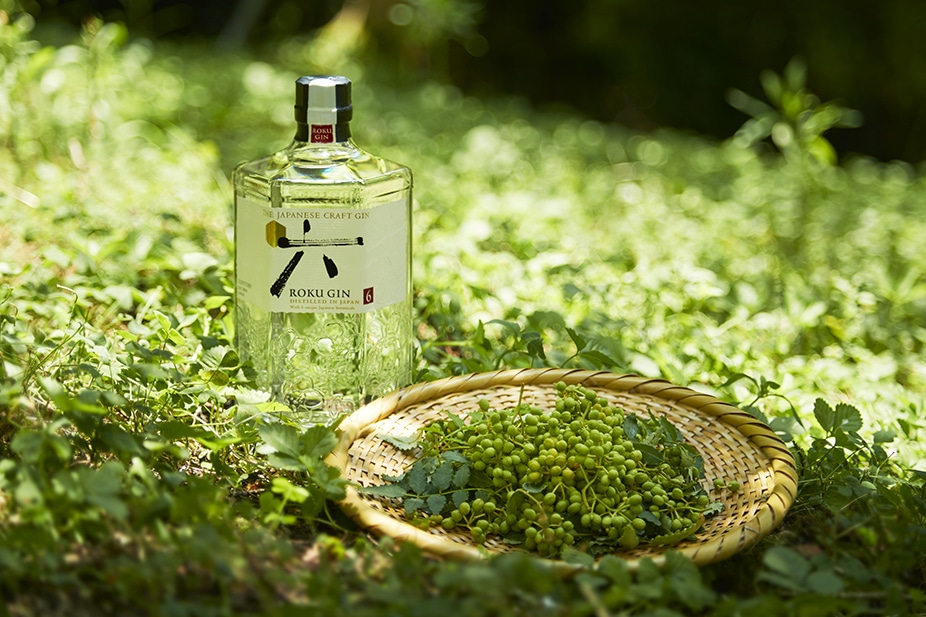
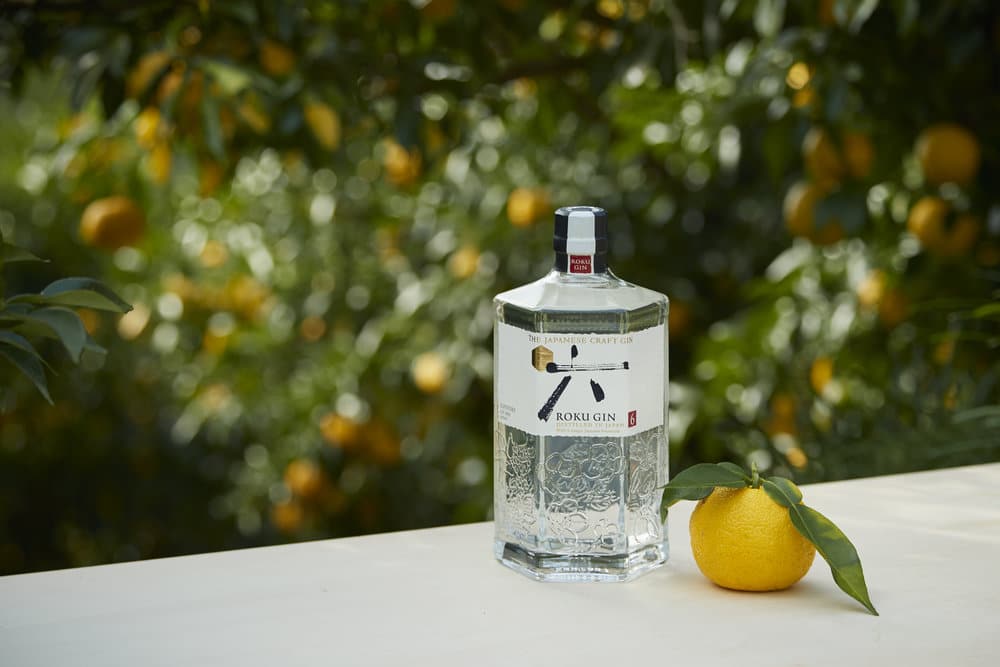
We’ll drink to that – seeing the happy faces at the other end of the line and hearing their feedback honestly makes the whole thing so worthwhile. So, looking to the future, tell us a little bit about the upcoming collaboration between TT Liquor and Roku Gin.
I’m super excited and, while I can’t claim any credit, I’ll do my best to describe it for your readers. So I think every participant on the virtual classes over the next few weeks should be getting their boxes which will contain a sample of the Roku Gin. Great chance to try what we’re all about. And if anyone needs more information, there’s plenty of stuff about Roku on YouTube and social media. Normally, me wittering away about some weird part of esoteric Japanese philosophy or Buddhist philosophy or Shintō philosophy. I don’t know if you’ve noticed, but I love the world of philosophy and how that affects flavour. But yeah, you should all be getting a lovely little sample, and there’ll be some brand literature in there as well that gives you a bit more information. And on there, there’ll be a QR code so you can scan that code and it’ll take you through to our brand hub where you’ll find this interview, some ideal cocktail serves, giveaways and more.
I think the whole thing is fantastic, it’s just a great chance to sample something new and then make some drinks that maybe you wouldn’t normally make because, actually, bartending is just pouring things from one bottle to another bottle and into a glass, right? The hard bit of our job is the stuff you guys don’t see. The easy and fun bit is the actual bit of making drinks! And we’re all quite happy to teach those of you that don’t do this for a profession how to make delicious drinks at home. So, hopefully, you’ll all see what I would consider a cocktail I would serve in the five-star hotels that I’ve managed. The yuzu Negroni, for me, is an incredibly well-balanced and complex drink that you could see yourself drinking in that darkly-lit £12 cocktail bar, right? But now, it’s on your couch with the dog sitting next to you and a blanket on. Couldn’t be much better than that. Happy days.
We’re going to do some very cool activations. You should, hopefully, see a Suntory greenhouse near you at some point soon.
Exactly. Happy days. So, in keeping with our chronological theme, let’s move further into the future. Do you have any exciting plans for Roku on the horizon that you can reveal here?
So Roku very much at the moment is about kind of building awareness and getting people to know about us. So we’ve just recently moved into the number two spot in the world of super-premium gins. So it’s just us versus Hendrick’s now. But no, I mean, who could compete with Hendrick’s? What an incredible spirit and gin that is. So it’s, for us, very much about rebuilding that reputation, making sure that once we come out of coronavirus, people are still reminded of us and that we’re out there making incredible spirits. I think they’re not always entirely open with me about new products and everything else, but I’m kind of crossing my fingers that we might start to see a few expressions of Roku that are a little bit different. We’ve seen the pink gin trend kind of come and go, so we’re not going to go down that route. But I think we might start to see some interesting expressions in the next two or three years. But who knows? The focus is very much getting Roku Gin to be the position that it should be, which is the one that you think of when you think of Asia, because, frankly, there’s no one like Suntory. It’s not just me saying that as a brand ambassador. They are the oldest spirits company in that part of the world, and they just get these incredible ingredients. So we’re going to do some very cool activations. You should, hopefully, see a Suntory greenhouse near you at some point soon. But exactly how that looks, we’re still deciding because a lot of our plans, somewhat, had to be shifted as a consequence of coronavirus. So it’s mainly about supporting the bars and building the brand.
Really exciting stuff. We’re loving the sound of this greenhouse! We’ll definitely keep an eye out for Roku in 2021.
Yeah. It’s all a bit secretive at the moment. But, if you’re interested in hearing more, I did an event called Bar Shun, which was a pop-up at the Mandrake Hotel for the course of London Cocktail Week. And that went so well that we’ve– we kind of embraced that idea of Japanese nature for that pop-up. And I think I’m quite excited to start doing more with that. But the exact way that looks, whether it’s a pop-up in different cities or whether it’s pop-ups in bars or who knows what, I don’t know yet. So there’s no way I could give you a preview because we don’t know ourselves!
Well, we appreciate you giving us a good glimpse! So, to wrap things up, what’s your all-time favourite cocktail personally?
Yeah. Absolutely. So I mean, whilst I properly, properly love cocktails, I drink them far less often for pleasure these days because, unsurprisingly, for work, I drink a lot of cocktails. And so on my days off, I’m like, “Get me a glass of good wine,” and that’s fantastic. It’s a hard one, but I think probably my all-time favourite would have to be a Negroni, unsurprisingly. Most bartenders will probably tell you the same; we all love Negronis, right? Another absolute favourite of mine is the classic piña colada. I know it sounds a bit lame, but again, it’s just a lovely cocktail. But the absolute favourite is a sherry cobbler. My partner is Spanish. Sherry is one of my all-time favourite things. And I really am a wine guy as much as I am a spirits guy. So it does tick off all the boxes that I love.
Last, but by no means least, tell us your favourite bottle? What are you drinking at the moment, James? And this can’t be Roku Gin!
I mean, I’m a big whisky collector. I’ve been collecting Japanese whisky for about nine years now or something. I got lucky to get in just before it all kicked off. So I’ve got a few good bottles. But being here with my grandmother, we’ve only brought with us a limited amount of booze, so I’ve only really got absolute favourites. So if I’m just generally drinking, it’s just a bottle of Toki, Suntory Toki. And these are both Suntory brand spirits because I, unsurprisingly, brought a lot of my work booze. And then my bottle that I’ve got ready for the next few weeks of Advent and Christmas is Hibiki 17, which is probably my all-time favourite whisky, and that’s my treat bottle for the next few weeks.
